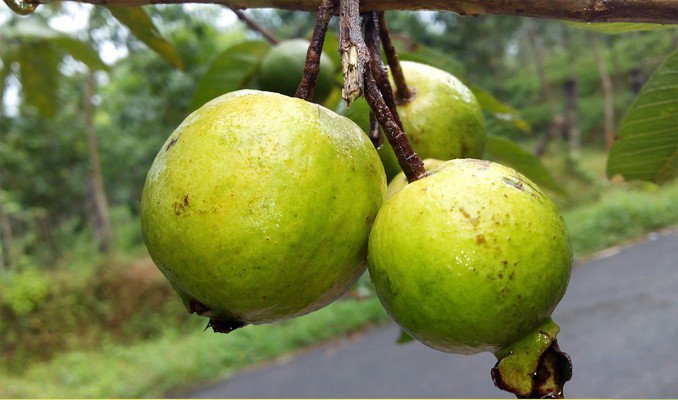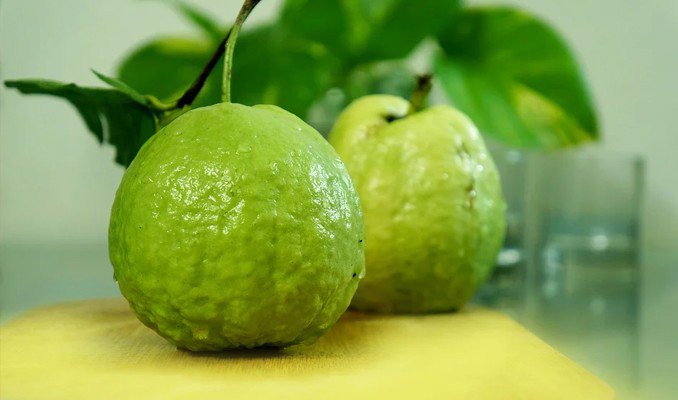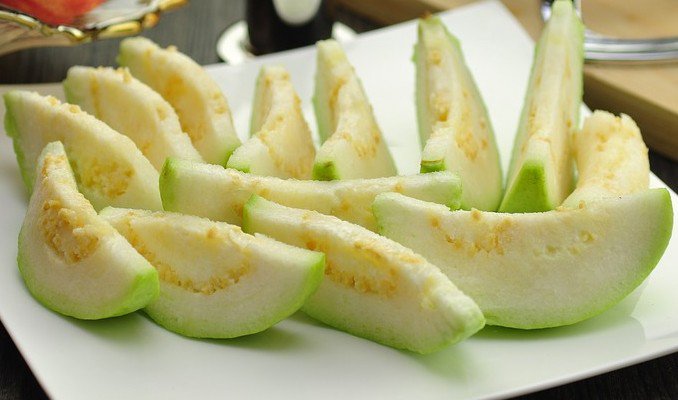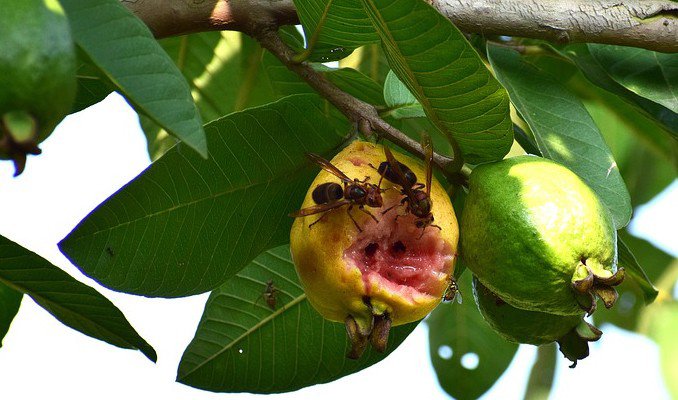Guava is one of those fruits that you rarely see in grocery stores. These subtropical fruits are only available for a month or so. With their sweet and sour-tangy flavors, they can be eaten alone, used in fruit salads, or even dipping sauces. Due to their sweetness and high sugar content, these fruits tend to not last very long once they are harvested. Therefore, most will wonder how long guava can last.
So how long does guava last? At room temperature, riped guava will last for 1-2 days, while unripped guava will last for about a week. In the fridge, riped guava will last for 4-5 days, while unripened guava will last 2-3 weeks. In the freezer, riped guava will last up to 8 months.
How Long Does Guava Last?
At room temperature, riped guava will last for about 1-2 days. This fruit doesn’t usually last very long due to their high sugary content. Once it’s exposed to warm temperature, it will start decreasing in quality right away.
For unripe guava, at room temperature, you can expect them to last for about a week. It will take about 2-4 days to ripened and another 1 to 2 days to retain their freshness before it starts going bad.
In the fridge, riped guava will last for about 4-5 days. Once it has started to ripen, you need to store them in the fridge quickly or they won’t last very long.
On the other hand, unripened guava will last a considerably long time. Keeping unripened guava in the fridge will keep them fresh for 2-3 weeks.
If you want to keep guava fruit fresh for a long time, the freezer is the best place to store them. In the freezer, riped guava will last for about 8 months. After 8 months, they will still be safe to eat, but the quality won’t be that good.
How To Store Guava
Unriped guava can be stored at room temperature for a couple of days until it’s riped. After that, you’ll have another couple of days left to eat them before it goes bad.
To store unripe or riped at room temperature, just make sure to keep them away from direct sunlight and other heat sources. These can ripen the guava fruit prematurely and cause it to go bad before you get a chance to eat it.
In the fridge, you can either store guava as a whole fruit, cut, or peeled. A whole fruit tends to last a couple of days longer than cut or peeled fruit. An airtight container or resealable plastic bag should be used to store them.
If storing them in an airtight container, store only cut or peeled guava fruit. A whole guava fruit tends to be too large for an average airtight container and you’ll only be able to store just a couple of them.
For plastic bags, you can store a whole fruit, cut, and peeled guava. Make sure to leave some room at the top so you’ll be able to seal the bag.
Another way to store guava in the fridge is simply to put them the whole guava fruit in the crisp section. When storing them, make sure to not put other fruits such as apples and bananas in the crisp section. These fruits produce ethylene, which will prematurely ripen the guava fruit.
Can You Freeze Guava?
If you want to keep guava fresh for later use, you can freeze them. Guava can be frozen as a whole, cut, or peeled fruit. By freezing them, they can retain their freshness for up to a year. After a year, the fruit will still be safe to eat, but the quality of it will decrease.
When freezing guava fruit, always freeze riped guava. Freezing unripe guava will destroy the texture and flavor of the fruit when it thaw. As the fruit thaw, the flesh will start to breakdown and become watery. Since it’s not able to ripen after thawing, the taste of it will be bland and slightly sour.
Whether you’re freezing whole, cut, or peeled guava, they should be stored in an airtight container or a resealable freezer bag. The airtight container should be approved for freezer usage.
If you’re using freezer bags to store guava, make sure to squeeze out as much air as possible before sealing it. The more air that’s in the bag, the higher the chances for the fruit to get freezer burn.
Another way to store guava in the freezer is to create a puree. Guava puree is great for making fruit smoothies, desserts, and even dipping sauces.
How To Freeze Guava
- Peel the skin off the guava and cut them in half.
- In a saucepan, make a thin syrup using 4 parts water to 2 parts sugar. Heat the pan until the sugar is dissolved into the water and let it cool.
- In an airtight container or freezer bag, gently put the guava fruits.
- Leave about an inch of space at the top of the container or the freezer bag.
- Pour the syrup into the container or bag.
- Seal the container tightly so no air can get in. For a freezer bag, remove as much air as possible from the bag before sealing it.
- Label the container or bag with the date and place them in the deepest part of the freezer.
How To Keep Guava Fresh Longer
Guava is one of those fruits that goes bad quickly after it’s harvested. This is due to their high sugar content. To keep them fresh longer, you’ll need to buy the right guava at the grocery store and know how to handle them properly. By doing so, you can extend the shelf life of the guava by even another week.
Buying Guava
At the grocery store, start by looking at each guava. You’ll want to examine each one carefully before buying it. Good quality guava will have no cuts or tears in them. Once it is exposed to air, the fruit will start to ripen quickly. After ripening, it will be only a couple of days before it goes bad.
If the appearance seems fine, pick up the guava and gently squeeze it. It should be firm when you squeeze it. If it feels soft or the skin breaks under gentle pressure, the guava is already spoiled or about to go bad. It’s best to find another guava to buy.
However, if you planning to eat it the same day, it’s fine to buy them if you like guava that is soft.
Handling Guava
Beginning from when you purchase guava at the grocery stores until you eat them, you’ll need to handle them with care. Guava bruises easily if not handled gently. Bruising will cause the guava to go bad quickly once.
When storing the fruit in a basket or a container, make sure to never stack guava on top of each other. When the guava is ripe, they tend to be really soft, and putting too much fruit in a basket will cause the skin to open. Therefore, putting 10 to 15 riped guava in a basket or container is enough.
How To Tell When Guava Is Bad
Guava usually goes bad right after they have ripened. When they go bad, there are several signs to look for.
The first thing to look for is the overall appearance. The color of the guava’s skin will start turning yellow when it’s riped, while the inside turn pink. At this point, it’s a sign that’s the guava bad, but you still may be able to eat it.
Along with the yellowish color, if you notice any ulcers, rotting spots, or breaks in the skin, the guava has spoiled.
If there are no signs on the fruit, grab the guava fruit in your hand. Squeeze the fruit lightly and it should be firm. If it starts tearing or easily collapse, it’s a good chance that the guava fruit is bad.
As for the smell, guava gives off a strong scent. Good guava will have a sweet and lemony scent to it. If it smells rotten or vinegary, the fruit is most likely past it’s prime and should be discarded.
Sometimes, there are no visible signs of the fruit going bad. Therefore, you can check the inside by cutting the fruit in half. If the inside of the fruit appears black or brown in color, the guava is spoiled.
Related Questions
How many varieties of guava are there?
There are 8 varieties of guava that exist. They are Strawberry guava, Pineapple guava, Beaumont, China white, Mexican cream, Red Malaysian, South African, and White Indian.
Can you eat the skin of a guava fruit?
The skin of the guava fruit is safe and should be eaten. The rind of the fruit has more vitamin C than an entire orange! It’s best to eat the rind with the flesh. Since there is no core in a guava fruit like an apple, simply cut them in half and eat the entire thing.




